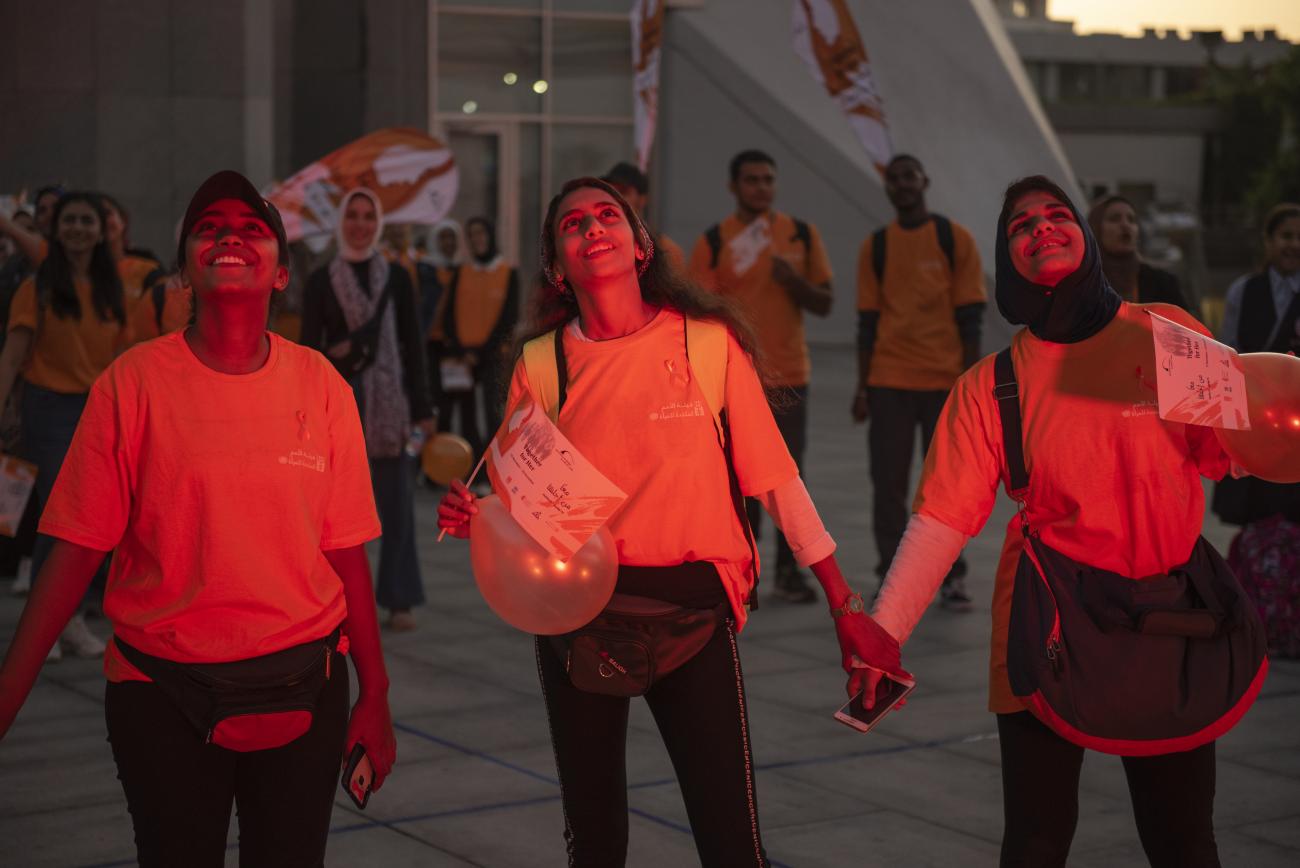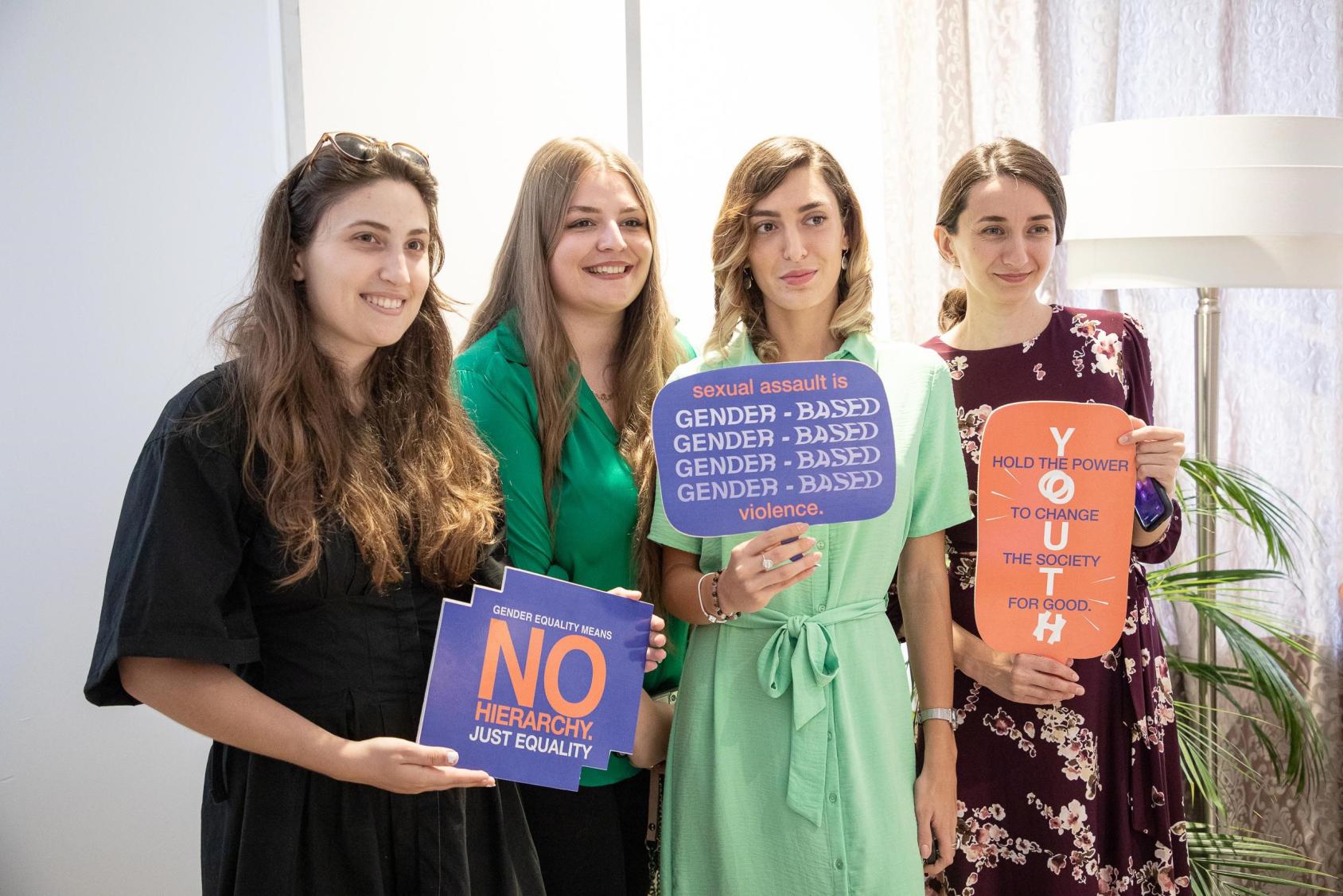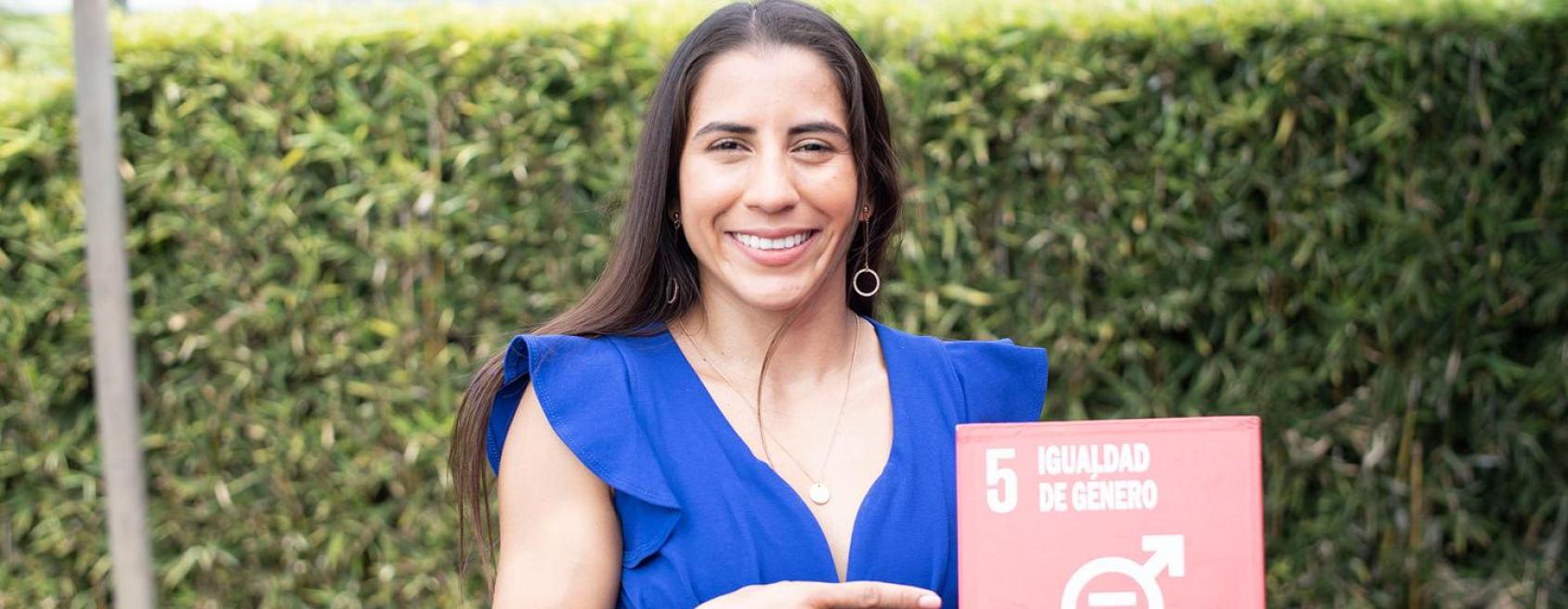RCs Catalysts for Change in Ending Violence Against Women

Violence against women, in all its forms, remains a deeply entrenched human rights violation, hindering progress towards gender equality and sustainable development. The International Day for the Elimination of Violence against Women, observed annually on November 25th, serves as a stark reminder of the pervasive challenges women and girls face globally.
To combat this global challenge, Resident Coordinators (RCs) are mobilizing UN country teams, governments, and civil society. They are spearheading initiatives to strengthen institutions, empower individuals, shift harmful social norms, and promote a culture of zero tolerance for violence. Their work demonstrates the power of collaborative action in driving meaningful progress towards a more just and equitable world for women and girls.

Albania: Strengthening institutions and empowering communities
In Albania, the Resident Coordinator's office (RCO) and the UN Family have played a pivotal role in galvanizing action to combat violence against women and girls. By fostering strong partnerships between government agencies, civil society organizations, and UN entities, the UN has helped to create a comprehensive and coordinated response to this critical issue.
One of the key achievements has been the strengthening of institutional mechanisms to address violence against women. Through collaborative efforts, Coordinated Referral Mechanisms (CRMs) are continuously strengthened, ensuring a more cohesive and effective approach to supporting survivors. These mechanisms bring together various service providers, including healthcare professionals, law enforcement officers, and social workers, to provide comprehensive assistance to those affected by violence.
The UN in Albania has also played a crucial role in capacity building and awareness raising. Through targeted training programmes, over 300* front-line workers responding to cases have been equipped with the necessary skills to effectively handle and refer cases of gender-based violence. Furthermore, extensive public awareness campaigns that challenge harmful social norms and promote a culture of zero tolerance for violence against women have been conducted each year, at least twice per year, with over 1,100* men and boys involved in awareness raising efforts to combat gender-based violence.
The impact of these efforts is evident in the increased use of the hotline number, which increased by 7 per cent between 2022 and 2023. The provision of essential support services was granted to over 400* survivors. The establishment of a specialized center in Tirana, and dedicated targeting to women and girls most left behind including women with disabilities and rural women, as well as One-Stop Centres for child survivors of violence in Shkoder and Fier, has further enhanced the response to vulnerable groups.
These efforts have been strongly supported by the international community, especially by SIDA (The Swedish International Development Cooperation Agency), through the UN Joint Programme Ending Violence Against Women in Albania, currently in its second phase of implementation.
By promoting collaboration and leveraging the expertise of diverse partners, the UN in Albania has contributed significantly to creating a safer and more equitable environment for women and girls.
Bangladesh: National and local action
To combat violence against women and girls in Bangladesh, the UN Country Team (UNCT) is working to strengthen national policies and empower individuals and communities. This comprehensive strategy recognizes that lasting change requires both policy changes and grassroots support for those affected by gender-based violence.
A key element of the UN's work has been supporting the government in developing and implementing gender-responsive policies and plans. This includes collaborating on national action plans addressing violence against women and children, as well as developing guidelines and manuals to ensure effective implementation of key policy objectives such as addressing son preference and gender-biased sex selection; and expanding access to daycare services. In addition, the UN supports the government in legislative reforms, especially criminalizing domestic violence and addressing sexual harassment by enacting laws. By strengthening the national framework for gender equality, the UN has helped create an environment that is more conducive to preventing and responding to violence against women.
Alongside policy advocacy, the UN has also focused on empowering women and girls through initiatives like Social Safety Nets Plus. Building upon existing social safety net schemes that target vulnerable women and adolescent girls through non-cash and vocational training, the UN is bringing education and empowerment components. These components directly address harmful social norms and gender inequality- the root causes of gender-based violence.
Through its comprehensive approach, which combines policy advocacy with direct support to individuals and communities, the UN in Bangladesh has contributed significantly to advancing gender equality and creating a safer environment for women and girls.

Costa Rica: Promoting human rights and community action
By fostering collaboration among UN agencies, government institutions, and civil society organizations, the RCO in Costa Rica has effectively promoted a human rights-based approach to addressing violence against women. Recognizing the interconnected nature of various forms of discrimination and violence, the UNCT is working to create a safe environment for everyone, with a particular focus on vulnerable groups such as women, migrants, indigenous peoples, and LGBTQIA+ individuals.
A key aspect of the UN's work has been promoting community-level action to address human rights concerns. This includes initiatives to protect migrants and refugees, prevent sexual exploitation and abuse, and strengthen comprehensive sexuality education. The UN has also supported efforts to reduce xenophobia, discrimination, and hate speech, recognizing that these forms of intolerance can contribute to a climate in which violence against women thrives.
One notable example of the UN's engagement with communities is support to address issues related to mental health, gender-based violence, and self-care for non-communicable diseases. Through workshops and training programmes, the UN has empowered community leaders to identify and address these interconnected issues, providing them with the tools and knowledge to support their communities effectively. This initiative equipped these leaders with the necessary tools to disseminate information and collaboratively create action plans with and for their communities. By empowering community leaders in this way, the UN is fostering local ownership and action to address violence against women. The programme works closely with the Ministry of Health to ensure alignment with national strategies and plans.
To further amplify this message of community engagement and reach wider audiences, UN Costa Rica is partnering with content creators, notable figures, and athletes like World Boxing Champion Yokasta Valle, who has joined campaigns to encourage the denunciation of gender-based violence, support for victims, and supporting men in developing healthy relationships and behaviors. These partnerships are combined with broader mass media outreach efforts to share messages in support of women's rights and to fight violence and discrimination against women.
This emphasis on community engagement and empowerment is crucial for creating lasting change. By fostering local ownership and action, the UN is contributing not only to the elimination of violence against women, but also to the objective of protecting human rights for everyone and building an equitable society.
Egypt: Expanding essential services and utilising
In Egypt, the RCO is fostering collaboration between the UNCT, government bodies, civil society actors, and local communities to develop an approach that prioritizes prevention, protection, and comprehensive support for survivors of gender-based violence. The UN focuses on strengthening existing government-led institutional frameworks to ensure effective prevention and response to all forms of violence against women and girls, with a strong emphasis on the most vulnerable.
A key achievement has been the expansion of essential services for women and girls affected by violence. Through UN support, over 39,500* individuals, including migrants and refugees, were able to access critical services such as legal aid, medical care, shelter and psychosocial support. These services, aligned with international guidelines, play a vital role in empowering survivors to heal.
Recognizing the importance of accessible reporting mechanisms, the UN has also partnered with national institutions like the National Council for Women (NCW) and the National Council for Childhood and Motherhood (NCCM) to strengthen complaint offices and helplines. A radio awareness campaign that was launched in collaboration with the NCW contributed to a significant increase in the number of reported cases, highlighting the effectiveness of public awareness initiatives in encouraging women to seek help and break the silence surrounding violence.
The UN in Egypt also collaborated with local civil society partners, including community-based and refugee-led organizations, on several national door-to-door campaigns and community mobilization efforts. These efforts reached more than 4.9* million people across the country with interactive programmes designed to raise awareness and empower community members to create positive change.
Technology and online spaces are increasingly being exploited to perpetrate gender-based violence against women and girls. The UN in Egypt is actively working to combat technology-facilitated violence against women and girls (TFVAWG) by preventing such practices, protecting victims, and advocating for the benefits of digitalization for women’s empowerment. Efforts are underway to launch a joint programme to further combat TFVAWG.
The overall collaborative approach by the UN in Egypt empowers individuals and communities in both online and offline spaces, paving the way for a future where all women and girls can live free from violence.
Uganda: Shifting social norms to end violence
In Uganda, progress towards gender equality and the elimination of violence against women and girls has been significantly driven by the UN, working closely with government institutions, cultural leaders, development partners, and civil society organizations. This collaborative effort has fostered an approach that addresses the root causes of gender-based violence and empowers communities to create lasting change.
A key focus of the UN's work has been on shifting harmful social norms. Through extensive awareness campaigns and community engagement programmes, UN entities have reached at least 20* million Ugandans with messages promoting gender equality and challenging traditional practices that perpetuate violence against women, including harmful practices such as female genital mutilation and child marriage. This has led to a significant decline in the acceptance of violence against women, with fewer people now believing it is justifiable for a man to beat his wife. For example, the 2023 Uganda Demographic and Health Survey found that only a third of Ugandans aged 15-49 believe it is justified for a man to beat his wife, down from nearly 50 per cent of women and over 40 per cent of men in 2016.
The UN in Uganda, with support from the European Union, has also worked to strengthen institutional frameworks and policies to protect women and girls, by working closely with communities, starting at the village level, to ensure everyone's rights are protected. Advocacy efforts have led to the passage of legislation addressing workplace harassment and violence, and numerous private sector companies have adopted policies to promote gender equality in their organizations. Furthermore, the UN has supported the development of data collection and reporting mechanisms, enabling more effective responses to gender-based violence. The UN has also facilitated the provision of support services to remote areas. This improved access to information and resources has encouraged communities to change harmful behaviors.
Access to justice for survivors of violence has been another priority. Through support for Special Court Sessions and legal aid programmes, the UN has helped to ensure that perpetrators are held accountable, and survivors receive the support they need to rebuild their lives. The UN has also worked with local community courts to better enforce laws and challenge harmful traditional beliefs, which has contributed to the increase in public confidence in the justice system.
By working across sectors and engaging a wide range of stakeholders, the RCO in Uganda is optimistic that the traditional values of Obuntumulamu (humanness and mutual respect) will influence the protection of all women and girls from violence. The RCO in Uganda remains dedicated to these efforts as a key part of the global goals for sustainable development.
Read more coordination results from Albania, Bangladesh, Costa Rica, Egypt and Uganda.
*All figures refer to results in 2023













